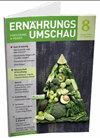膳食手机应用——年轻人的接受度:一项定性研究
IF 0.3
4区 医学
Q4 NUTRITION & DIETETICS
引用次数: 8
摘要
智能手机性能的快速发展导致了软件应用程序(简称app)的广泛增长[2,3]。这些应用程序还包括食品和营养应用程序(以下简称食品应用程序),例如食品跟踪应用程序。这些应用程序类似于权重日志;他们记录饮食行为并产生视觉反馈(实际与目标),如能量和营养[4]。然而,大多数可用的食品应用程序没有经过科学评估[2,4,5 - 9];功能和数据质量可能会有很大差异[4]。鉴于人们对基于技术的工具的亲和力,食品应用程序可以作为一种适当的干预策略,引发生活方式和饮食行为的改变[5,10 - 13]。能力集群nutriCARD旨在为青少年和年轻人开发一款食品应用程序,这将对饮食行为产生积极影响。这项定性研究是为了在开发过程的早期确定(不)使用食品应用程序的原因[14],重点关注以下感兴趣的领域:从年轻人的角度来看,食品应用程序必须包含哪些因素才能长期使用?本文章由计算机程序翻译,如有差异,请以英文原文为准。
Dietary mobile apps - acceptance among young adults : a qualitative study
The rapid development in the performance of smartphones has led to a widespread growth in software applications, or apps for short [2, 3]. These also include food and nutrition apps (hereinafter referred to as food apps), such as e.g. food tracking apps. These apps are similar to weight logs; they record eating behavior and generate visual feedback (actual vs. target) about e.g. energy and nutrients [4]. However, most of the available food apps are not scientifically evaluated [2, 4, 5–9]; functions and data quality may vary significantly [4]. In view of the population’s affinity to technology-based tools, food apps could represent an appropriate intervention strategy to trigger changes in lifestyle and eating behavior [5, 10–13]. The competence cluster nutriCARD aims to develop a food app for adolescents and young adults which will positively influence eating behavior. This qualitative study was carried out in order to determine reasons for (non-) use of food apps [14] early on in the development process, focusing on the following area of interest: From the perspective of young adults, which factors must a food app incorporate in order to be used in the long-term?
求助全文
通过发布文献求助,成功后即可免费获取论文全文。
去求助
来源期刊

Ernahrungs Umschau
医学-营养学
CiteScore
0.50
自引率
40.00%
发文量
0
审稿时长
>12 weeks
期刊介绍:
The ERNÄHRUNGS UMSCHAU publishes reviews and original articles on the whole area of nutrition science, including nutrition behavior, nutrition economics, public health nutrition, nutritional medicine and other areas of importance for human nutrition.
 求助内容:
求助内容: 应助结果提醒方式:
应助结果提醒方式:


